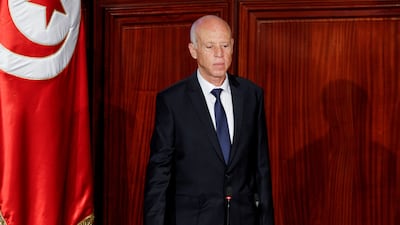Tunisia's President Kais Saied extended until further notice the 30-day "exceptional period" initiated on July 25 to dismiss the government, freeze parliament and take sole control of the government, his office said on Tuesday.
He also extended an order lifting immunity for the country's lawmakers. He will address the Tunisian people in the coming days, the statement added, without providing further details.
Earlier, Parliament Speaker Rached Ghannouchi, who leads the country's largest political party Ennahda, dissolved the party's executive bureau amid calls for him to step down.
The president has spent much of the last month out of sight of the public and refused communication with all but a select inner circle and a few key allies.
His decision will have the support of the public, according to many Tunisia watchers. The constitutional court, responsible for reviewing such an extension, has yet to be formed, six years after Tunisia's constitution was written.
Here's what Mr Saied has accomplished during his 30-day mandate – and what is left unfinished.
Health
Early in July, Tunisia was groaning under the weight of a deadly wave of the Delta variant that swept the country.
Daily positivity rates were over 35 per cent, and hospitals were filled to capacity as overworked medical staff struggled to save lives. A failed vaccine drive left thousands stranded in the heat without a jab and laid bare the ineptitude with which the government was handling the crisis.
Discontent with the health situation was one of the driving factors in the July 25 protests that spurred Mr Saied's consolidation.
Since taking full control of the government, Mr Saied initiated two successful mass vaccine campaigns that collectively inoculated more than a million people, or roughly eight per cent of the country's population. He has also secured millions of vaccine doses from the UAE, the US and other donors.
The campaign, along with the easing of a nighttime curfew in the waning days of summer vacation, have garnered Mr Saied considerable praise and support.
Government
In addition to prime minister Hichem Mechichi, Mr Saied dismissed several ministers in key cabinet positions, including the finance and health ministries, and has undertaken a complete overhaul of the Ministry of the Interior. He has yet to select his prime minister, although he has said in recent communications he intends to do so imminently.
The president has installed caretaker figures to lead ministries in the interim, but does not have the power to make the appointments full and permanent, as ministers should be appointed by the PM, approved by the Parliament and sworn in by the president.
Mr Saied has also sacked and replaced several governors.
One of Mr Saied's core campaign promises was to root out corruption in politics and business. Shortly after his consolidation, he revoked immunity for members of parliament and has since allowed several MPs with outstanding legal issues to be arrested.
Economy
Although Covid-19 helped fuel the protests that urged Mr Saied to assume sole control of the government, long-simmering discontent with the country's economic situation is at its core. Unemployment is high and the price of consumer goods is rising.
The economy shrank 8.2% last year, while a deficit of 11.5% drove public debt to 87% of gross domestic product, according to the International Monetary Fund.
Shortly before Mr Saied's intervention, PM Mechichi and a delegation which included the governor of the Central Bank were negotiating a multi-billion dollar aid package with the IMF. Since July 25, those conversations have been paused, despite upcoming deadlines for Tunisia to pay back nearly $5 billion in loans.
In the first week of his mandate, Mr Saied called on businesses and pharmacies to lower prices and avoid panic that could lead to inflation. Many complied, but economists say such a position is unsustainable without clear economic policy to support it.
Although the palace has not confirmed a short list of candidates for prime minister, many speculate the presidents top picks include several economists and experts in international finance.


















